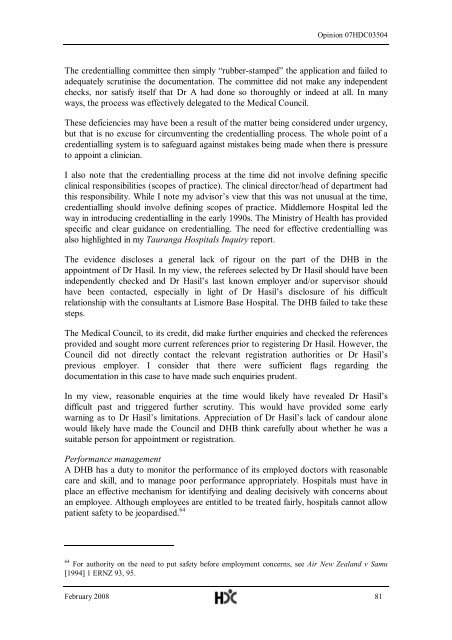Roman Hasil and the Whanganui DHB - Health and Disability ...
Roman Hasil and the Whanganui DHB - Health and Disability ...
Roman Hasil and the Whanganui DHB - Health and Disability ...
Create successful ePaper yourself
Turn your PDF publications into a flip-book with our unique Google optimized e-Paper software.
Opinion 07HDC03504<br />
The credentialling committee <strong>the</strong>n simply “rubber-stamped” <strong>the</strong> application <strong>and</strong> failed to<br />
adequately scrutinise <strong>the</strong> documentation. The committee did not make any independent<br />
checks, nor satisfy itself that Dr A had done so thoroughly or indeed at all. In many<br />
ways, <strong>the</strong> process was effectively delegated to <strong>the</strong> Medical Council.<br />
These deficiencies may have been a result of <strong>the</strong> matter being considered under urgency,<br />
but that is no excuse for circumventing <strong>the</strong> credentialling process. The whole point of a<br />
credentialling system is to safeguard against mistakes being made when <strong>the</strong>re is pressure<br />
to appoint a clinician.<br />
I also note that <strong>the</strong> credentialling process at <strong>the</strong> time did not involve defining specific<br />
clinical responsibilities (scopes of practice). The clinical director/head of department had<br />
this responsibility. While I note my advisor’s view that this was not unusual at <strong>the</strong> time,<br />
credentialling should involve defining scopes of practice. Middlemore Hospital led <strong>the</strong><br />
way in introducing credentialling in <strong>the</strong> early 1990s. The Ministry of <strong>Health</strong> has provided<br />
specific <strong>and</strong> clear guidance on credentialling. The need for effective credentialling was<br />
also highlighted in my Tauranga Hospitals Inquiry report.<br />
The evidence discloses a general lack of rigour on <strong>the</strong> part of <strong>the</strong> <strong>DHB</strong> in <strong>the</strong><br />
appointment of Dr <strong>Hasil</strong>. In my view, <strong>the</strong> referees selected by Dr <strong>Hasil</strong> should have been<br />
independently checked <strong>and</strong> Dr <strong>Hasil</strong>’s last known employer <strong>and</strong>/or supervisor should<br />
have been contacted, especially in light of Dr <strong>Hasil</strong>’s disclosure of his difficult<br />
relationship with <strong>the</strong> consultants at Lismore Base Hospital. The <strong>DHB</strong> failed to take <strong>the</strong>se<br />
steps.<br />
The Medical Council, to its credit, did make fur<strong>the</strong>r enquiries <strong>and</strong> checked <strong>the</strong> references<br />
provided <strong>and</strong> sought more current references prior to registering Dr <strong>Hasil</strong>. However, <strong>the</strong><br />
Council did not directly contact <strong>the</strong> relevant registration authorities or Dr <strong>Hasil</strong>’s<br />
previous employer. I consider that <strong>the</strong>re were sufficient flags regarding <strong>the</strong><br />
documentation in this case to have made such enquiries prudent.<br />
In my view, reasonable enquiries at <strong>the</strong> time would likely have revealed Dr <strong>Hasil</strong>’s<br />
difficult past <strong>and</strong> triggered fur<strong>the</strong>r scrutiny. This would have provided some early<br />
warning as to Dr <strong>Hasil</strong>’s limitations. Appreciation of Dr <strong>Hasil</strong>’s lack of c<strong>and</strong>our alone<br />
would likely have made <strong>the</strong> Council <strong>and</strong> <strong>DHB</strong> think carefully about whe<strong>the</strong>r he was a<br />
suitable person for appointment or registration.<br />
Performance management<br />
A <strong>DHB</strong> has a duty to monitor <strong>the</strong> performance of its employed doctors with reasonable<br />
care <strong>and</strong> skill, <strong>and</strong> to manage poor performance appropriately. Hospitals must have in<br />
place an effective mechanism for identifying <strong>and</strong> dealing decisively with concerns about<br />
an employee. Although employees are entitled to be treated fairly, hospitals cannot allow<br />
patient safety to be jeopardised. 64<br />
64 For authority on <strong>the</strong> need to put safety before employment concerns, see Air New Zeal<strong>and</strong> v Samu<br />
[1994] 1 ERNZ 93, 95.<br />
February 2008 81

















